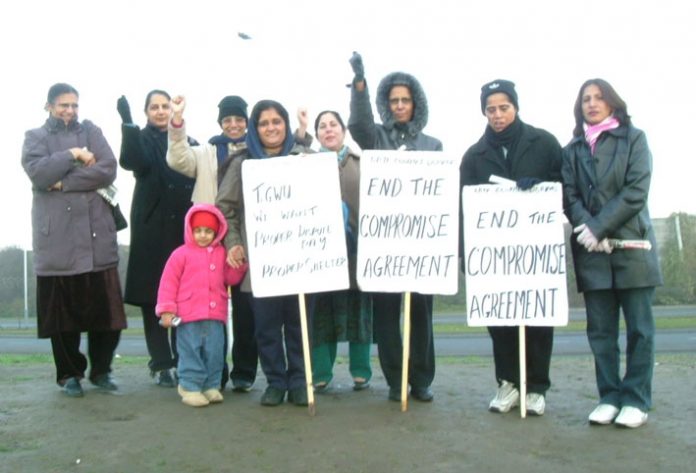
The TGWU trade union and the author of the Gangmasters Licensing Act 2004, Labour MP Jim Sheridan, last Wednesday organised a briefing in the House of Commons to rally opposition to government plans to exclude food processing and packaging from the Act.
The Department of the Environment, Food and Rural Affairs (DEFRA) is carrying out a ‘consultation’ on exclusions from the Act.
The ‘consultation’ is accepting submissions up to December 12th.
The TGWU and the TUC, are part of an industry-wide Coalition, that includes leading supermarket chains, Citizens Advice Bureau, food processors, agencies, community groups and other trade unions.
The TGWU says: ‘Legislation must apply across the industry – food processing and packaging should NOT be excluded from the legislation.’
‘Exclusions from the Act must be minimal – as agreed by ministers when the Act was passed in July 2004 there must be no blanket exclusions for any sector.
‘Food processing and packaging must be INCLUDED in the scope of the Act.
‘Only full inclusion will help the new Gangmasters Licensing Authority work with the industry to tackle criminality and create a level playing field for law-abiding labour providers.
‘Gangmasters in food processing and packaging must be registered and licensed
‘It must be an offence to use an unlicensed gangmaster wherever they operate within the food industry.’
DEFRA is proposing four options.
The TGWU says: ‘Options 1, 2 and 3 will cause confusion within the industry, create loopholes and fail to protect workers.
‘Only Option 4 will meet the objectives of the Act and commands the support of the industry stakeholders.’
In its submission to the DEFRA consultation, the TGWU says: ‘The trend within the industry is for gangmaster operation to increase across the food chain.’
It adds that while there has been a 30 per cent in first stage (farming) activities, there has been 15 per cent increase in second stage (food processing and packing) over the past ten years and the ‘natural scope’ for gangmasters to expand ‘lies within the growing second stage and manufacturing sector’.
It adds that ‘labour providers’ i.e. agencies ‘work across the food activity, swapping workers between contracts be those contracts with food processing or within agriculture’.
The TGWU stresses: ‘If secondary food processing is excluded and the Act is limited to primary agriculture alone, then around 150,000 workers will immediately fall outside of the scope of the Act and be beyond the protection of the law.
‘The T&G has evidence that abuse of workers in food processing is commonplace.
‘The abuses include: bonded labour practices, illegal and systematic deduction from wages, non-payment of the minimum wage, poor or non-existent health and safety practice, excessive charges for accommodation and cleaning, sexual harassment, harassment including threat of the sack for joining a trade union and workers “tricked” into signing a contract for a certain rate of pay only to find they are earning a lesser sum than agreed.’
The union says of the four ‘options’ being put forward for consideration by DEFRA, only Option 4 states there should be no exclusions for processing and packaging of food and agricultural products.
The TGWU finds Option 3 – ‘the exclusion of all “off farm” facilities, linked to a review of off farm labour provider activity by the GLA (Gangmaster Licensing Authority)’ – particularly devious.
The TGWU says: ‘Option 3 will result in off-farm activities being moved to premises nearby, and possibly requiring no change in workforce, in order to evade licensing as gangmasters and farmers/employers realise that by moving their activities off farm and out of initial stage processing they can avoid the costs of licensing and inspection.’
The union adds: ‘The “off-farm” exclusion seeks to establish a boundary between so called “licensed and unlicensed” processing.
‘This is a false distinction and opens up a massive loophole for rogue operators and will leave tens of thousands of workers vulnerable to exploitation and beyond the protection of the law.’
The TGWU adds: ‘Through our work organising workers in food processing we have been made aware of some alarming levels of exploitation these workers, many of them migrant and unaware of the labour law of this country and their rights while they reside here.’
The union gives examples of ‘unscrupulous behaviour by some employers’.
• ‘In Norfolk one employment agency contract states that employees will be paid “approximately £5 an hour” (in reality, almost certainly much less).
‘They also have to pay a £45 a week “management fee”. They are charged £70 a week for accommodation, but could be evicted at 24 hours notice.
‘One worker took home just £53.87 for a 40-hour week – a miserable, illegal £1.30 per hour.
• ‘Another payslip shows workers paying £50 each week for a seat on the minibus that takes them to the food plant.
‘Even if they have no work that day, they still have to pay, meaning they can easily end up in debt, in practice bonded to their employer, while the gangmaster makes £500 per week just for getting the ten workers to their place of work.
• ‘In both Wales and the North West, workers have been told that if they join a union, they and their colleagues will be sacked.
‘In Wales, two women workers whom had complained about poor health and safety standards were sacked and would have been immediately evicted from their home if the union had not intervened.
• The T&G took up the case of Polish agency workers working in a meat processing factory in Exeter who were charged £40 a week each for ten people sharing a two-bedroomed house.
• ‘An inquest into the death of two Polish labourers on a Twyford fruit farm reported the men were killed when they became entangled with a rope-reeling machine.
‘The farm manager admitted one of the dead men had to ask another of the Polish workers on the farm to translate his instructions.’